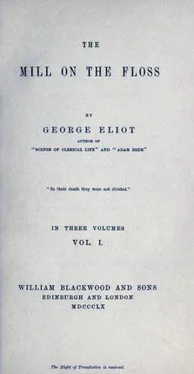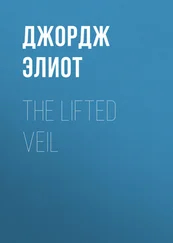Chapter I. Outside Dorlcote Mill
A wide plain, where the broadening Floss hurries on between its green banks to the sea, and the loving tide, rushing to meet it, checks its passage with an impetuous embrace. On this mighty tide the black ships — laden with the fresh-scented fir-planks, with rounded sacks of oil-bearing seed, or with the dark glitter of coal — are borne along to the town of St. Ogg's, which shows its aged, fluted red roofs and the broad gables of its wharves between the low wooded hill and the river-brink, tingeing the water with a soft purple hue under the transient glance of this February sun. Far away on each hand stretch the rich pastures, and the patches of dark earth made ready for the seed of broad-leaved green crops, or touched already with the tint of the tender-bladed autumn-sown corn. There is a remnant still of last year's golden clusters of beehive-ricks rising at intervals beyond the hedgerows; and everywhere the hedgerows are studded with trees; the distant ships seem to be lifting their masts and stretching their red-brown sails close among the branches of the spreading ash. Just by the red-roofed town the tributary Ripple flows with a lively current into the Floss. How lovely the little river is, with its dark changing wavelets! It seems to me like a living companion while I wander along the bank, and listen to its low, placid voice, as to the voice of one who is deaf and loving. I remember those large dipping willows. I remember the stone bridge.
And this is Dorlcote Mill. I must stand a minute or two here on the bridge and look at it, though the clouds are threatening, and it is far on in the afternoon. Even in this leafless time of departing February it is pleasant to look at, — perhaps the chill, damp season adds a charm to the trimly kept, comfortable dwelling-house, as old as the elms and chestnuts that shelter it from the northern blast. The stream is brimful now, and lies high in this little withy plantation, and half drowns the grassy fringe of the croft in front of the house. As I look at the full stream, the vivid grass, the delicate bright-green powder softening the outline of the great trunks and branches that gleam from under the bare purple boughs, I am in love with moistness, and envy the white ducks that are dipping their heads far into the water here among the withes, unmindful of the awkward appearance they make in the drier world above.
The rush of the water and the booming of the mill bring a dreamy deafness, which seems to heighten the peacefulness of the scene. They are like a great curtain of sound, shutting one out from the world beyond. And now there is the thunder of the huge covered wagon coming home with sacks of grain. That honest wagoner is thinking of his dinner, getting sadly dry in the oven at this late hour; but he will not touch it till he has fed his horses, — the strong, submissive, meek-eyed beasts, who, I fancy, are looking mild reproach at him from between their blinkers, that he should crack his whip at them in that awful manner as if they needed that hint! See how they stretch their shoulders up the slope toward the bridge, with all the more energy because they are so near home. Look at their grand shaggy feet that seem to grasp the firm earth, at the patient strength of their necks, bowed under the heavy collar, at the mighty muscles of their struggling haunches! I should like well to hear them neigh over their hardly earned feed of corn, and see them, with their moist necks freed from the harness, dipping their eager nostrils into the muddy pond. Now they are on the bridge, and down they go again at a swifter pace, and the arch of the covered wagon disappears at the turning behind the trees.
Now I can turn my eyes toward the mill again, and watch the unresting wheel sending out its diamond jets of water. That little girl is watching it too; she has been standing on just the same spot at the edge of the water ever since I paused on the bridge. And that queer white cur with the brown ear seems to be leaping and barking in ineffectual remonstrance with the wheel; perhaps he is jealous because his playfellow in the beaver bonnet is so rapt in its movement. It is time the little playfellow went in, I think; and there is a very bright fire to tempt her: the red light shines out under the deepening gray of the sky. It is time, too, for me to leave off resting my arms on the cold stone of this bridge….
Ah, my arms are really benumbed. I have been pressing my elbows on the arms of my chair, and dreaming that I was standing on the bridge in front of Dorlcote Mill, as it looked one February afternoon many years ago. Before I dozed off, I was going to tell you what Mr. and Mrs. Tulliver were talking about, as they sat by the bright fire in the left-hand parlor, on that very afternoon I have been dreaming of.
Chapter II. Mr. Tulliver, of Dorlcote Mill, Declares His Resolution about Tom
"What I want, you know," said Mr. Tulliver, — "what I want is to give Tom a good eddication; an eddication as'll be a bread to him. That was what I was thinking of when I gave notice for him to leave the academy at Lady-day. I mean to put him to a downright good school at Midsummer. The two years at th' academy 'ud ha' done well enough, if I'd meant to make a miller and farmer of him, for he's had a fine sight more schoolin' nor I ever got. All the learnin' my father ever paid for was a bit o' birch at one end and the alphabet at th' other. But I should like Tom to be a bit of a scholard, so as he might be up to the tricks o' these fellows as talk fine and write with a flourish. It 'ud be a help to me wi' these lawsuits, and arbitrations, and things. I wouldn't make a downright lawyer o' the lad, — I should be sorry for him to be a raskill, — but a sort o' engineer, or a surveyor, or an auctioneer and vallyer, like Riley, or one o' them smartish businesses as are all profits and no outlay, only for a big watch-chain and a high stool. They're pretty nigh all one, and they're not far off being even wi' the law, I believe; for Riley looks Lawyer Wakem i' the face as hard as one cat looks another. He's none frightened at him."
Mr. Tulliver was speaking to his wife, a blond comely woman in a fan-shaped cap (I am afraid to think how long it is since fan-shaped caps were worn, they must be so near coming in again. At that time, when Mrs. Tulliver was nearly forty, they were new at St. Ogg's, and considered sweet things).
"Well, Mr. Tulliver, you know best: I've no objections. But hadn't I better kill a couple o' fowl, and have th' aunts and uncles to dinner next week, so as you may hear what sister Glegg and sister Pullet have got to say about it? There's a couple o' fowl wants killing!"
"You may kill every fowl i' the yard if you like, Bessy; but I shall ask neither aunt nor uncle what I'm to do wi' my own lad," said Mr. Tulliver, defiantly.
"Dear heart!" said Mrs. Tulliver, shocked at this sanguinary rhetoric, "how can you talk so, Mr. Tulliver? But it's your way to speak disrespectful o' my family; and sister Glegg throws all the blame upo' me, though I'm sure I'm as innocent as the babe unborn. For nobody's ever heard me say as it wasn't lucky for my children to have aunts and uncles as can live independent. Howiver, if Tom's to go to a new school, I should like him to go where I can wash him and mend him; else he might as well have calico as linen, for they'd be one as yallow as th' other before they'd been washed half-a-dozen times. And then, when the box is goin' back'ard and forrard, I could send the lad a cake, or a pork-pie, or an apple; for he can do with an extry bit, bless him! whether they stint him at the meals or no. My children can eat as much victuals as most, thank God!"
Читать дальше












